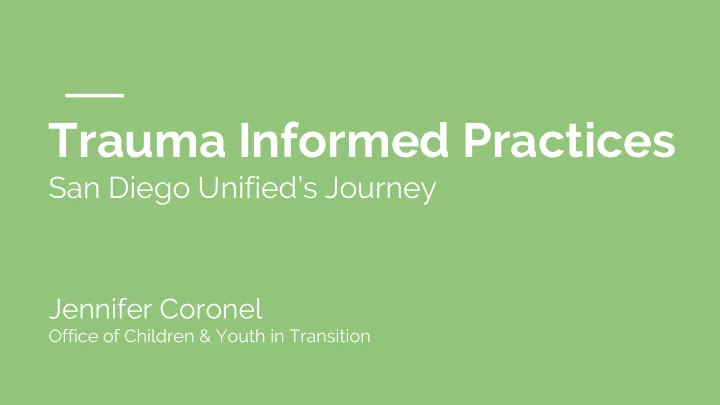

Trauma Informed Practices San Diego Unified’s Journey Jennifer Coronel Office of Children & Youth in Transition
SDUSD Overview ● 2nd largest district in California ● 103,000 student ● 13,559 employees ● represents more than 15 ethnic groups and more than 60 languages and dialects ● 117 traditional elementary schools, 9 K-8 schools, 24 traditional middle schools, 22 high schools, 49 charter schools, 13 atypical/ alternative schools and 5 additional program sites
Office of Office of Children and Youth in Transition The Office of Children & Youth in Transition supports the continuity of education of students in transition including: students in foster care, students experiencing homelessness, students who are military dependents, students who are refugees, and students transitioning from juvenile justice facilities. The office also includes the district's Home/ Hospital and Transition Supports School, SARB, and Placement and Appeals. .
Our Story - 2015/2016 ● 2015/2016 ● Gabriella Grant, Director of the California Center of Excellence for Trauma Informed Care ● Trainer 1,030 staff and community members including ○ Survivors of Torture ○ SDUSD Police ○ Nurses ○ Counselors ○ Teachers ○ Classified Staff ○ MH Providers/School Psychologists ● Community and site Paper Tigers screenings
Our Story - 2016/2017 ● New leadership ● Change in staff ● Regroup ● Analyzed data and the impacts of past TIC work ● SDCOE Train the Trainers ● Creation of a 4 Series TIC Professional Development Series
Our Story - 2017/2018 1. Trauma and the Brain 1. The Trauma Informed School Site 1. Self-Care for the Educator 1. MindUp Curriculum Implementation
Results ● 71 trainings held ● 35 school sites trained ● 1,002 participants
CALIFORNIA HEALTHY SCHOOL SURVEY Data *Perception vs. Reality 8
ACADEMICS & AGENCY
Transforming School Climate. National Standards of Positive & Collaborative School Culture FOSTERING SAFETY & PROMOTING STUDENT CONNECTION FOR COMPETENCIES STUDENTS AND Positive Educators that model and nurture ADULTS School love for learning. Norms, values, expectations that Climate support people socially, Students that understand how emotionally and physically. learning is relevant to their life experiences and relate to core Members of the school content understanding their community are engaged and strengths and those of others. respected. ENHANCING Students, staff and families working STUDENT together to develop and foster meaningful experiences for students. ; ENGAGEMENT
Recommend
More recommend